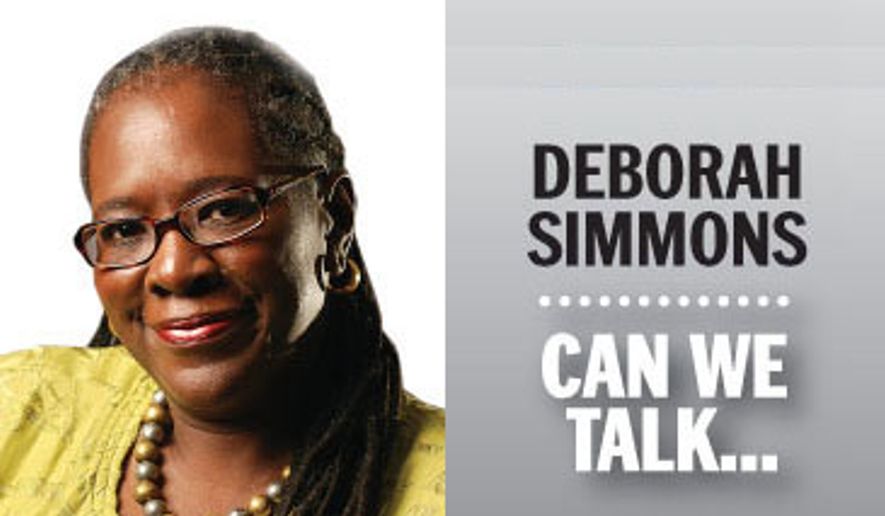OPINION/ANALYSIS:
Pope Francis is laying a lot on us during his visit to the United States, and he’s not yet done. His remarks in New York at the United Nations shouldn’t be cast aside, and we should pay attention to what he espouses as a way forward in Philadelphia at the World Meeting of Families.
The theme of that gathering is important, of course, anytime and anywhere — and more so now, considering the state of family affairs making the rounds of the globe.
• Family outlook. As U.N. members and other world leaders continue discussions this month about our global future, here are a few noteworthy tidbits from a Pew Research survey that asked whether we thought our children will be better off than we are. Latin Americans are slightly more optimistic than Africans (58 percent to 56 percent), Asian/Pacific Islanders are far more optimistic than Middle Easterners (51 percent to 32 percent), and Americans are as optimistic as Middle Easterners and slightly more than Europeans (32 percent to 28 percent).
• Poverty. This from CNBC.com: “World leaders on Friday meet at the United Nations headquarters to commit to 17 new ’sustainable development goals’ meant to guide development policy for the next 15 years. The first and most prominent is the eradication by 2030 of ’extreme poverty everywhere’ as defined by the World Bank’s $1.25 a day line.”
That global-poverty yardstick was set in 1990, when dollar figure was, well, $1. Bank authorities, who will meet in October in Lima, Peru, are expected to move the line to $1.90.
SEE ALSO: Reince Priebus claims Republican inroads with Hispanics
According to the World Bank, the rankings of the top 10 countries with extreme poor are: India, 30 percent; Nigeria, 10 percent; China, 8 percent; Bangladesh, 6 percent; Congo, 5 percent; Indonesia, 4 percent; Madagascar, Pakistan and Tanzania, each 2 percent; the U.S. and the rest make up 28 percent.
• HIV/AIDS. Millennium Development Goal 6 is “to halt by 2015 and begin to reverse the spread of HIV and AIDS, through prevention, care, treatment, and mitigation services for those affected by HIV and AIDS,” says the World Bank.
Here an alarming fact from the World Health Organization from 2013: An estimated 35 million people worldwide are living with HIV/AIDS.
There is a very, very bright spot for families in South Africa, where HIV/AIDS rates practically wipe out the prospects of moms breastfeeding their babies or providing their life-sustaining milk to others’ babies. Thanks to antiretroviral drugs, other medical advances and philanthropies and much prayer, South African women are again championing breast milk, which naturally boosts the immune system.
• Immigration. In his address Thursday to Congress, Pope Francis mentioned the search for a better life for our children: “We need to avoid a common temptation nowadays — to discard whatever proves troublesome. Let us remember the Golden Rule: ’Do unto others as you would have them do unto you.’”
Another Pew study reveals our views on those “others.” Sixty-nine percent of Italians think immigrants are a burden on their country, 70 percent of Greeks feel the same, and 52 percent of the people of France and Poland feel likewise. Meanwhile, 41 percent of Americans have a similar view.
SEE ALSO: Pope Francis proposes ‘golden rule’ of politics, demands end to death penalty
Overall, the most positive views of immigrants’ work habits and talents are among Germans (66 percent), British (52 percent) and Americans (51 percent). Here again, Italians and Greeks don’t hold immigrants in high esteem (both at 19 percent).
• Illegal/undocumented immigrants. There was much ado about the 5-year-old California girl, Sofia Cruz, who was embraced by the pope along his parade route in D.C. She said she didn’t want her parents to be deported because they are undocumented. Well, when you look at the top six states that account for 60 percent of illegals who call a state home, you can see why little Sofia is worried: California, Texas, Florida, New York, New Jersey and Illinois. Sofia is from Los Angeles County’s city of South Gate, whose population is an estimated 94,000 and the Hispanic population makes up 94.8 percent of that. (Look for voter registration drives to be ratcheted up in those states in 2016.)
• Blurred lines. In the U.S., the roles of fathers and mothers are converging, for better and for worse. Women and mothers used to be the primary caretakers of children and the household, while men and fathers were the primary breadwinners. With both genders earning and making the bread, modern moms and pops may bicker over housekeeping and child-rearing responsibilities. A 2013 Pew study pointed out that 74 percent of adults said the increasing number of women working for pay has made it harder for parents to raise children, and half said that it has made marriages harder to succeed. At the same time, the study pointed out, two-thirds of respondents said it has made it easier for families to live comfortably.
Conflicted Americans. Isn’t that typical?
No wonder families are mired in doo-doo.
This week, I let Pope Francis have the last word:
“It is my wish that throughout my visit the family should be a recurrent theme. How essential the family has been to the building of this country! And how worthy it remains of our support and encouragement! Yet I cannot hide my concern for the family, which is threatened, perhaps as never before, from within and without. Fundamental relationships are being called into question, as is the very basis of marriage and the family. At the risk of oversimplifying, we might say that we live in a culture which pressures young people not to start a family, because they lack possibilities for the future. Yet this same culture presents others with so many options that they, too, are dissuaded from starting a family.”
• Deborah Simmons can be reached at dsimmons@washingtontimes.com.
• Deborah Simmons can be reached at dsimmons@washingtontimes.com.




Please read our comment policy before commenting.